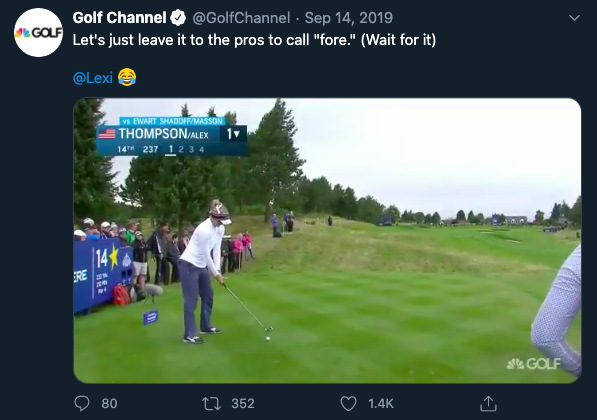Home » Culture
Category Archives: Culture
“The Cult of Cults”: Pop Culture Representations of a Minority Religious Group

On December 8, I submitted my last paper for the semester, wrapping up what has been, for many, a stressful period. Having just seen the trailer for the new HBOMAX docuseries “Heaven’s Gate: The Cult of Cults,” I wondered how the religious group was represented and decided to take a look…
To continue reading go to:
What is the Country’s Reality?

Have you seen the new HBO show “Lovecraft Country”? In the series premiere, set in 1950s America, we follow Atticus Freeman (played by Jonathan Majors), Letitia “Leti” Lewis (Jurnee Smollett), and George Freeman (Courtney B. Vance) as they travel to “Ardham,” Massachusetts, in hopes of finding Atticus’s father, Montrose Freeman (Michael K. Williams). He went missing while searching for the family’s history…
To continue reading go to:
Essentialism and Female Golfers
When watching pro-golfers play a match, you can sometimes hear the players yell “FORE,” which gives warning to spectators ahead that their ball is coming towards them. This is very important, so no one is injured while watching this game. This is the golfers or even their cadies (but mainly the golfer) job to give the warning. This brings me to Saturday, September 14th, 2019, pro-golfer Lexi Thompson had just hit from the tee box, and her ball was drifting to the right when a spectator yelled for her, “FORE right!” which Thompson responded with, “Wasn’t that bad” and proceeded to glare at the spectator. Commentators were laughing and joking at this interaction while the golf channel tweeting out:
While this may be a funny moment to some, I wasn’t necessarily thinking that. I played golf for four years at McDaniel College, and I know how Thompson feels having someone not playing speak for them. It also got me thinking, “would this happen if it was Tiger Woods or Rory McIlroy?” Thompson is 24 and has played golf professionally since she was 16 having 14 professional wins under her belt. Looking at some of the comments left on this tweet, we see people (men mainly) criticize Thompson for not yelling “FORE,” one comment read, “Yeah. Let a it hit a spectator in the head but let’s spare Lexi’s feelings”. Others called her arrogant for not yelling fore and saying she has a fragile ego for the comment.
But I ask again if this was Tiger Woods or Rory McIlroy, would someone have yelled “FORE” for them? I don’t think so, and that is because they are both men in a heavily male-dominated sport with titles under their belts. Women did not have a golf organization in the United States until 1917 with the Women’s Tournament Committee of the United States Golf Association (USGA). The first professional female golfer was Helen Hicks in 1934, who was one of the founding members of the Ladies Professional Golf Association (LPGA). Babe Zaharias, a former Olympian, would play in the Los Angeles Open in 1938, a Professional Golfers Association (PGA) event. No woman before had tried to play against professional male golfers.
Playing golf as a female athlete is challenging because it is such a male-dominated sport, and you are often faced with criticism that your male counterpart probably wouldn’t meet. “Be happy with the score you got… Don’t be so emotional over that putt.” Are some things I have heard from male coaches and spectators. The pressure of winning or doing well in a match in this sport is immense, and if you are having a lousy hole (had too many strokes hitting or putting) or just hitting it to the right and someone speaks for you, you would probably glare too. The pressure is worse for female athletes because of the societal standards of being perfect or as good as their male counterparts.
Craig Martin’s book A Critical Introduction to The Study of Religion breaks down how society creates categories we are placed into. Martin explains this in a simple breakdown:

Applying this to Thompson or any female golfer, we see a societal structure that produces stereotypes.

This breakdown can apply to other things, of course, because it highlights how society puts us into boxes and the formation of stereotypes. While playing colligate golf, I had an opposing teams’ coach continuously tell me how to do things that I knew, or he would call me sweetheart or darling even though he knew my name. From my own experience, this coach maybe unknowingly had boxed me into a stereotype that I couldn’t play golf and had to be taken care of like a child. But how does one handle these situations? Thompson glared at the man who yelled for her, my coach finally had a conversation with this other coach, so I had an ally.
At the end of the day, though, female athletes are put into these boxes and slowly have been breaking out, showing their male counterparts and society that, yes, we are female athletes, but that’s just it; we are athletes. And that is the most important thing here that athletic performance should not focus on gender. When discussing this with a friend who knew nothing about golf, his first question was, “Wait; there is a separate league for female golfers? Why are they not in the same league?” It’s a good question that I do not have an answer for. Maybe someday, there will only be one league for golfers, and perhaps eventually, female golfers won’t have others speak for them when their shot is a little off to the right.
